Eileen Klassen Hamm recalls how, as a young adult, she considered a Mennonite Voluntary Service term to be a good and natural thing to do.
“It was an earlier era, where the church that owns Mennonite Central Committee (MCC) really fostered that sense of voluntary service,” she says. “There were a whole host of opportunities to do a stint of volunteer work. It was really part of church culture at the time.”
Klassen Hamm, who is executive director of MCC Saskatchewan, says that, during the 1980s and ’90s, voluntary service was seen as an acceptable way to spend a few years, and this attitude helped shape her identity.
“If there are things we believe in, it’s okay to forego the salary and benefits that society thinks we need,” she says of church culture when she was a young adult.
A new reality
But times have changed and so has the culture surrounding volunteering. These days, MCC tries to create volunteer opportunities for people who may only have a couple hours to give each month or who may want to engage as a group in a one-off volunteer experience.
“Can we find meaningful things for them to do?” Klassen Hamm asks, noting that the work “must be meaningful for them but also helpful for MCC.”
MCC Saskatchewan’s annual Buckets of Thanks event fits the bill. Each October, church groups and families gather to fill plastic buckets with items needed to create relief kits.
“It’s a lovely intergenerational volunteer opportunity,” she says. “I have wondered how that can shape people over the years.”
What is and isn’t volunteering
Volunteering can be defined as freely offering to do something, as in, “My son volunteered to make supper.” It can also be defined as working for an organization without getting paid, as in, “My mother volunteered at the thrift store for many years.”
By the latter definition, unless one is a pastor or paid church employee, everything one does in church is volunteering. Or is it?
Ryan Siemens, the executive minister of Mennonite Church Saskatchewan, thinks there should be a distinction between work we do at church and jobs we volunteer for in the community.
Siemens says the church is a household of faith. The Apostle Paul uses the household imagery of brothers and sisters in his letters. In a household not everything one does is voluntary. “There’s stuff you got to get done, so you do it,” he says, using teaching his son Isaiah to empty the dishwasher as an example. “When Isaiah’s cleaning the dishwasher, he’s not volunteering,” says Siemens, adding, “There are household codes that are not very popular because of the hierarchy implicit in them.”
Likewise, he says, “Worship leading is not volunteering, it’s pulling your weight. . . . We all need to be doing our share for our life together.”
Volunteer or servant?
Ryan Wood, who is principal of Rosthern Junior College High School (RJC), agrees with Siemens. “I do a lot of volunteering through the school or through church,” says Wood, “but I don’t know if I really think about it as volunteering. I kind of think about it as my job in those places. I think about it as duty.”
Volunteering is an integral part of community life at RJC.
“We are very intentional about fostering volunteerism,” says Wood. “We affirm students’ involvement in active service to the community.”
Participation in sports teams, choirs, clubs and committees is seen as an act of strengthening community. But these activities, although voluntary, aren’t necessarily thought of as volunteerism.
“We rarely use the word ‘volunteerism,’ ” Wood says. “It’s definitely framed more from the perspective of service to community.” And service, according to Wood, is just something one does as a follower of Christ. “Jesus is at the centre, at the core of the whole thing. Once you commit [to Christ], you’re not really volunteering, you’re just living out your commitment.”
Volunteering begins with an example
Whether one calls it volunteering, serving or living out one’s commitment to Christ, creating a culture of volunteerism begins with an example.
In John 13, Jesus assumes a servant role and washes his disciples’ feet. And then he teaches them: “Now that I, your Lord and teacher, have washed your feet, you also should wash one another’s feet. I have set you an example that you should do as I have done for you.”
But creating a culture of volunteerism or service takes more than just example. Even the very best example must be followed. There must be opportunity and there must be invitation.
Many young people have their first volunteer experience at summer camp.
Mark Wurtz, executive director of Youth Farm Bible Camp near Rosthern, Sask., recalls volunteering as a counsellor-in-training (CiT) when he was a teenager.
“My youth pastor was going to be the camp pastor. He encouraged me to come,” says Wurtz. As a camper the previous summer, Wurtz had seen the CiTs enjoying themselves and thought it might be something he’d like to do. But it was his youth pastor’s invitation that got him started.
Inviting youth to serve as CiTs is more effective than waiting for them to sign up, he says, adding that he also thinks it’s important to match the volunteer with the job. Admittedly, with young people who don’t know their interests or abilities, this can be tricky. But the beauty of summer camp, he says, is that young people can learn to do many different things.
“We throw them in the fire,” he says. “There are not many [opportunities] in church where they can get as much leadership experience.” Wurtz says his own summer volunteer experience was crucial to finding out who he was.
Volunteering with MDS
Not unlike summer camp, Mennonite Disaster Service (MDS) provides opportunity and invitation to volunteer through its family projects. Ida Buhler, chair of MDS Saskatchewan, and her husband Ed have participated in family projects with each of their grandchildren.
Unlike most MDS work, family projects don’t involve cleaning up after disasters. Rather, they are multi-generational work bees, with children of all ages, parents and grandparents building and doing development work, often at summer camps.
The Buhlers directed a family project at Camp Elim, south of Swift Current, Sask., where participants built two cabins and walkways, stained decks on existing cabins, and cleaned up the beach area, says Buhler. “The whole idea is to try and show younger kids that this is fun,” she says. “You’re helping others and, when you leave, you’ve done something for someone.”
In addition to family projects, MDS facilitates youth projects. These have included making improvements to an apartment building for low-income residents and replacing windows and roofing at a Bible college.
“The emphasis [of family and youth projects] is more on trying to get them hooked on volunteering,” says Buhler. These projects provide children and youth with opportunities for “giving back, sharing and doing something that you’re not getting paid for,” she adds.
Buhler says that “those little, warm moments” of appreciation from people served by MDS keep volunteers coming back again and again. “Every time you volunteer you have that good feeling and you want to do it again,” she says.
The beauty of relationships
But there is another, even stronger, motivator for many volunteers, and that is the formation of relationships. Some develop meaningful relationships with fellow volunteers; others form impactful relationships with the people they serve.
Erica Baerwald is human-resources coordinator for MCC Saskatchewan. For her, volunteering is about community. “My involvement with MCC started 15 years ago . . . volunteering with a kids club,” she says. “I formed relationships with those kids. Seeing them grow and thrive was a beautiful journey. That is what hooked me into MCC.”
Baerwald says that MCC tries to “give people opportunities and then works at creating community.” She adds, “We have to pay attention to the environment we’re inviting people into.” Meaningful work is part of that environment, but events like potlucks also help “create a culture that is important to people.”
I learned how to be a volunteer
By Donna Schulz, Saskatchewan Correspondent
Volunteer experiences do shape us. As do the examples of others:
- Years before I was born, my parents hosted a Mennonite immigrant family in their home. This was no small sacrifice. The newcomers added another five people to their household of six.
Mom and Dad gave up the second floor of their house for the Foth family. Their family lived with mine for a couple of years. The parents worked alongside my parents in the dairy and the Foth children went to school with my siblings. The two families formed a bond of friendship that continues to this day. This was my earliest and most profound example of volunteering. But I doubt Mom and Dad thought of it as volunteering. They were just living out their commitment to Christ.
- When I was 19, Helen, the woman whose children I babysat, invited me to help teach English to the Vietnamese refugees our church sponsored. I was happy to volunteer, but if Helen hadn’t invited me, I don’t think I would have done it. I had no experience and didn’t have the confidence, or even the awareness of my ability, to know this was something I could do.
- If I think of my most impactful volunteer experiences—the ones I would willingly repeat—they were the ones that brought relationship and community to my life. Whether teaching English to refugees, serving on a board or committee, or serving watermelon and rollkuchen (deep-fried pastry) at a Mennonite Central Committee relief sale, the work is meaningful not only because it fills a need but because it’s undertaken with, and for, others.
For discussion
1. What have been your volunteer experiences? Who were the dedicated volunteers who helped teach you about the importance of giving to others? What is the difference between volunteering and “pulling your weight”?
2. Eileen Klassen Hamm remembers that when she was a young adult, voluntary service was part of the church culture. Who were the young people from your congregation who signed up for a year or two of voluntary service? How did the experience of these young service workers impact the church in the long term?
3. Donna Schulz writes, “But times have changed and so has the culture surrounding volunteering.” What changes have you seen? Do you think young people have the same vision for service that their grandparents had when they were young? Who are the faithful volunteers of today?
4. Schulz says that many volunteers appreciate the meaningful relationships they develop while volunteering. Do you agree? How would you explain why you volunteer?
5. What volunteering experiences do you find most appealing? How can we better foster a culture of service in our churches?
—By Barb Draper


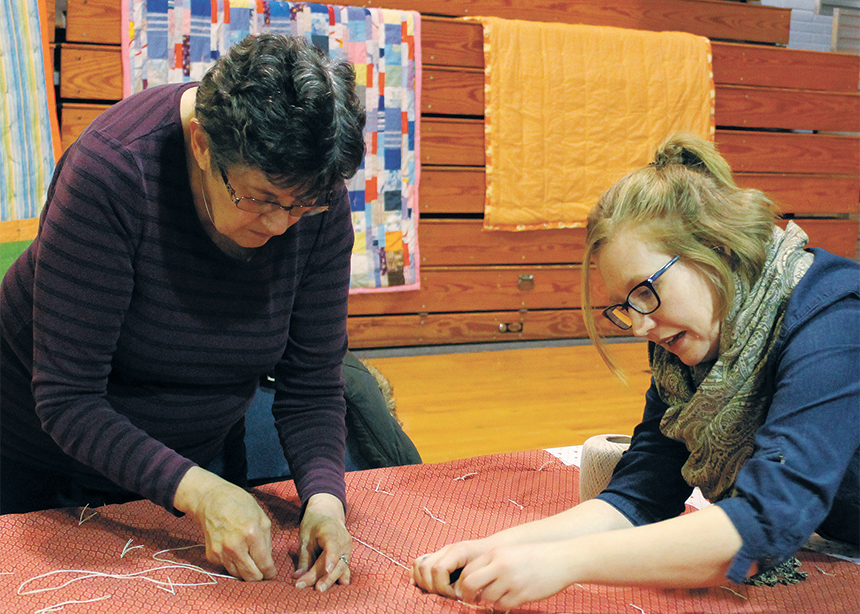



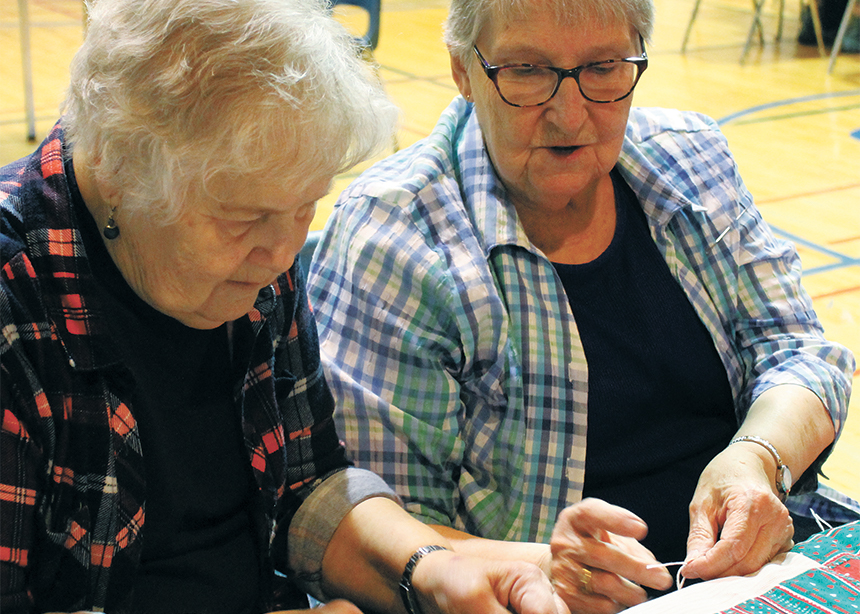


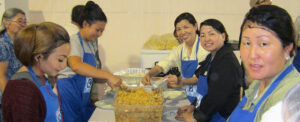
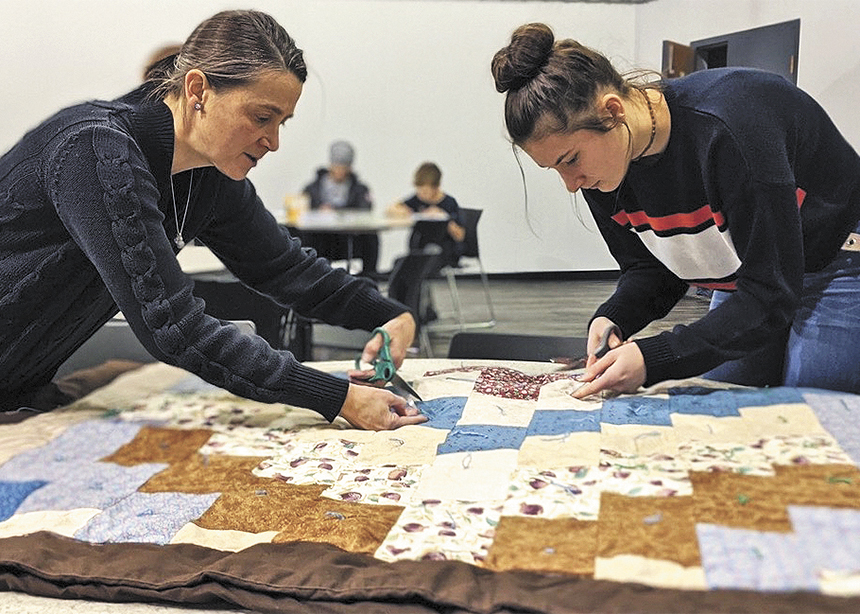
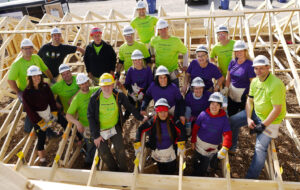

Leave a Reply
You must be logged in to post a comment.